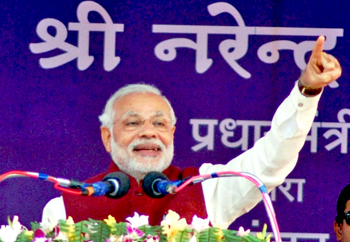New Delhi, Jan 30: To successfully implement e-governance, the country must think about 'mobiles first' and give importance to mobile governance, said Prime Minister Narendra Modi Friday.
Addressing the 18th National Conference on e-Governance through Twitter, Modi said: "I urge you to explore ways to provide as many services as possible through mobiles. Let us bring the world into our mobile phones!"
"While we look at e-Governance, let us think about 'mobile first' and thus give importance to m-Governance (mobile governance)," he added in another tweet.
Modi said that the conference brings together several delegates from central and state governments, armed forces, academia, industry and private sector while this year's themes revolves around digital governance, skill development and employability.
"Centre is committed to realising dream of a Digital India, with a vision to make India a digitally empowered society & knowledge economy," he said.
The prime minister said that he wanted to attend the conference personally but could not do so, therefore he took to Twitter.
"I wanted to personally attend the conference but was unable to do so. However, there was no way I could miss interacting with you," he tweeted.
"I thought - despite not attending, how can I connect with you. That is when I decided to use technology & talk to you via this medium," added Modi in another tweet.







Comments
Add new comment